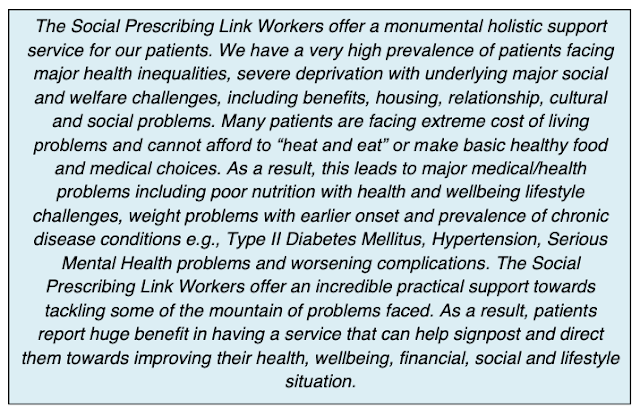The agenda for tomorrow's Community and Wellbeibg Scrutiny Committee includes some very important and complex items and it is hard to see how in the limited time available they will receive the full scrutiny and discussion that they merit.
One item is the report of the Task Group on Social Prescription that perhaps deserves a meeting of its own.
The video above from Hillingdon, Harrow and Brent UK outlines the aims of social prescription, an approach advocated by Theresa May, that is now being widely adopted and extended. The Task Group's recommendations would systematise its implementation in Brent.
In his Forward to the Task Group Report Cllr Ketan Sheth, the Committee's Chair says:
Social prescribing has been identified as being potentially key to addressing health inequalities across Brent, as residents who live in areas of high deprivation are more likely to have worse health outcomes due to socio-economic factors. To enable social prescribing to effectively tackle Brent’s deeply entrenched health inequalities, its resources and funding must be distributed fairly, so that residents who are more likely to be impacted by health inequalities have sufficient opportunities to access the support they need.
The socoiologist Basil Bernstein wrote regarding the pressures on schools to address society's ills that 'Education cannot compensate for society'. One could argue now that 'GPs cannot compensate for society', even with the aid of social prescription.
Advocates of social prescription will point to the fact tht many visits to GPs are about issues that affect health, such as poverty, poor housing, loneliness, Referral to voluntary agencies to address these are of benefit to the person concerned and frees up the GP's time to address medical issues.
The Task Group outline the context:
Rebecca Brown in 'The Ethics of Social Prescribing: An Overview' in a paragraph entitled 'A band aid on a bullet wound?' wrote:
Social prescribing emerges from a recognition that, often, health problems arise in the context of challenging personal and social circumstances. Serious efforts to combat NCDs may necessitate significant structural changes to current social practices and structures. Work on the social determinants of health has established the links between social deprivation and poor health outcomes, and suggests that the pervasive effects of social inequality on health, beginning at birth and persisting throughout someone’s life, are unlikely to be addressed simply through social prescribing. It should be noted that social prescribing requires a vibrant voluntary and community sector to flourish; more disadvantaged areas may have fewer community assets, thereby potentially contributing to Tudor Hart’s inverse care law.
The worry is that key social determinants of health are not tackled through broader social reform; instead, social prescribing is used as a smoke screen for change without addressing some of the more fundamental issues contributing to health inequalities within society. This might be an ungenerous interpretation of the motivation behind social prescribing, but it places an onus on those tasked with implementing social prescribing services to ensure such interventions are properly evaluated and not used to deflect attention from remaining problems, and from undertaking other (potentially politically unpopular) solutions. More optimistically, it is plausible that social prescribing could form a basis for political willingness to begin to tackle the engrained problems of social deprivation and health inequality.
Much social prescribing is aimed at older people but a recent article in the Nursing Times looks at younger people's mental health where the 'prescription' is often outdoor social and physical activities.
This approach to mental health is currently endemic in the Western world, reflecting the neoliberalism within the wider systems of society (Timimi, 2021). The idea behind it is that you as an individual are responsible for your own actions, feelings, wellbeing etc. So if you’re not feeling better after engaging with the interventions offered, the fault lies with you, rather than the breakdown of society around you.
The increase in social prescribing also correlates with cuts in the public sector, with things previously readily available, such as food vouchers, now only obtainable with a prescription from your GP.
My fear is that the current move towards social prescribing is just another plaster on the gaping wound that is the current state of children’s mental health. The social prescribing academy in the UK concedes that the sparse evidence base for this type of intervention makes it difficult to know where best to focus resources.
The danger of people feeling worse if the 'prescription' does not work for them is cited in other reviews and it is clear that more systematic research is needed to evaluate the approach.
The Task Group report gives an example of a social prescription with a positive outcome:
A GP Surgery makes the connection with the cost of living crisis:
Social prescribing perhaps has some parallels with foodbanks in that it performs a useful and necessary function in an unequal society but at the same time addresses the symptoms rather than the causes of inequality. Political action is required to address the causes.

























